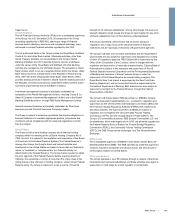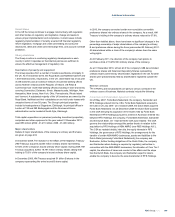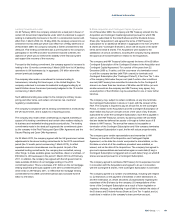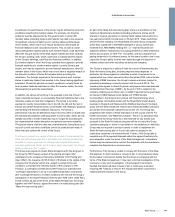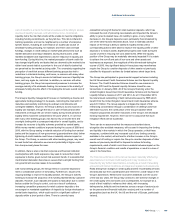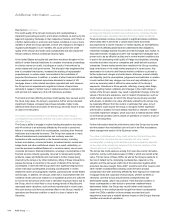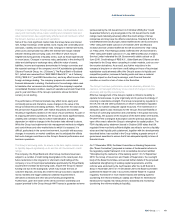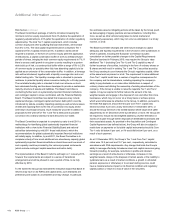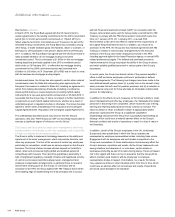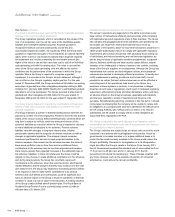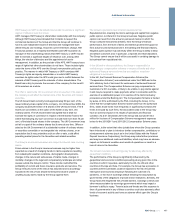RBS 2010 Annual Report Download - page 409
Download and view the complete annual report
Please find page 409 of the 2010 RBS annual report below. You can navigate through the pages in the report by either clicking on the pages listed below, or by using the keyword search tool below to find specific information within the annual report.
In particular, the performance of the Group may be affected by economic
conditions impacting EU member states. For example, the financial
problems recently experienced by the governments of certain EU
member states (including Greece and Ireland) may lead to the issuance
of significant volumes of debt by such member states and European
Union entities, which may in turn reduce demand for debt issued by
financial institutions and corporate borrowers. This, as well as credit
rating downgrades experienced by such member states, could adversely
affect the Group’s access to the debt capital markets and may increase
the Group’s funding costs, which could have a material adverse impact
on the Group’s earnings, cash flow and financial condition. In addition,
EU member states in which the Group operates have agreed to provide
financial assistance to certain member states, currently Greece and
Ireland, and may be required to provide financial assistance to other EU
member states in the future, which may in turn have a negative impact on
the financial condition of those EU member states providing the
assistance. The Group’s exposure to the economies of such member
states, in particular Ireland, has resulted in the Group making significant
provisions. Should the adverse economic conditions currently faced by
such member states be replicated in other EU member states, the risks
discussed above would be exacerbated.
In addition, the Group will continue to be exposed to the risk of loss if
major corporate borrowers or counterparty financial institutions fail or are
otherwise unable to meet their obligations. The Group is currently
exposed to country concentration risk in the US, the UK and the rest of
Europe and certain business sector concentration risk relating to personal
and banking and financial institution exposures. The Group’s
performance may also be affected by future recovery rates on assets and
the historical assumptions underlying asset recovery rates, which (as has
already occurred in certain instances) may no longer be accurate given
the unprecedented market disruption and general economic instability.
The precise nature of all the risks and uncertainties the Group faces as a
result of current economic conditions cannot be predicted and many of
these risks are outside the control of the Group.
The Group is subject to a variety of risks as a result of implementing the
State Aid restructuring plan and is prohibited from making discretionary
dividend or coupon payments on existing hybrid capital instruments
(including preference shares and B shares) which may impair the Group’s
ability to raise new Tier 1 capital.
The Group was required to obtain State Aid approval for the aid given to
the Group by HM Treasury as part of the placing and open offer
undertaken by the company in December 2008 (the “First Placing and
Open Offer”), the issuance of £25.5 billion of B shares in the capital of the
company (the “B shares”) which are, subject to certain terms and
conditions, convertible into ordinary shares of the company to HM
Treasury, a contingent commitment by HM Treasury to subscribe (the
“Contingent Subscription”) for up to an additional £8 billion of B shares
(the “Contingent B shares”) if certain conditions are met and the Group’s
participation in the Asset Protection Scheme (the “APS”) (the “State Aid”).
In that context, as part of the terms of the State Aid approval, the Group,
together with HM Treasury, agreed the terms of a restructuring plan (the
“State Aid restructuring plan”).
As part of the State Aid restructuring plan, there is a prohibition on the
making of discretionary dividend (including preference shares and B
shares) or coupon payments on existing hybrid capital instruments for a
two-year period which commenced on 30 April 2010. These restrictions
will prevent the company, the Royal Bank and other Group companies
(other than companies in the RBS Holdings N.V. group, (which was
renamed from ABN AMRO Holding N.V. on 1 April 2010) which are
subject to different restrictions) from paying dividends on their preference
shares and coupons on other Tier 1 securities, and the company from
paying dividends on its ordinary shares, for the same duration, and it may
impair the Group’s ability to raise new capital through the issuance of
ordinary shares and other securities issued by the company.
The Group is subject to a variety of risks as a result of implementing the
State Aid restructuring plan, including required asset disposals. In
particular, the Group agreed to undertake a series of measures to be
implemented over a four-year period from December 2009, which include
disposing of RBS Insurance, the Group’s insurance division (subject to
potentially maintaining a minority interest until the end of 2014). The
company also agreed to divest its global card payment services business,
Global Merchant Services (“GMS”), by the end of 2013, subject to the
company retaining up to 20 per cent. of GMS if required by the purchaser,
its interest in RBS Sempra Commodities LLP (“RBS Sempra
Commodities”), the Group’s joint venture with Sempra Energy and a
leading global commodities trader and the Royal Bank branch-based
business in England and Wales and the NatWest branches in Scotland,
along with the Direct small and medium-size enterprise (SME) customers
and certain mid-corporate customers across the UK. The Group has
progressed with certain of these disposals over the course of 2010. For
further information, see “Material Contracts”. There is no assurance that
the price that the Group receives or has received for any assets sold
pursuant to the State Aid restructuring plan will be at a level the Group
considers adequate or which it could obtain in circumstances in which the
Group was not required to sell such assets in order to implement the
State Aid restructuring plan or if such sale were not subject to the
restrictions contained in the terms thereof. Further, if the Group fails to
complete any of the required disposals within the agreed timeframes for
such disposals, under the terms of the State Aid approval, a divestiture
trustee may be empowered to conduct the disposals, with the mandate to
complete the disposal at no minimum price.
Furthermore, if the Group is unable to comply with the terms of the State
Aid approval, it could constitute a misuse of aid. In circumstances where
the European Commission doubts that the Group is complying with the
terms of the State Aid approval, it may open a formal investigation. At the
conclusion of any such investigation, if the European Commission
decided that there had been misuse of aid, it could issue a decision
requiring HM Treasury to recover the misused aid which could have a
material adverse impact on the Group.
407RBS Group 2010
Additional information


